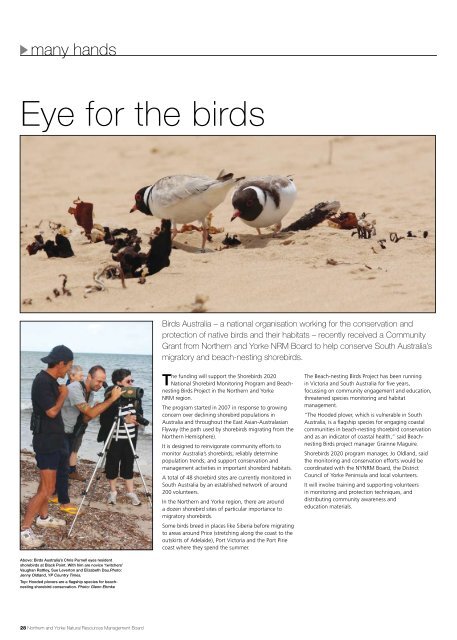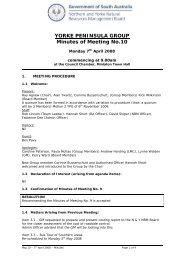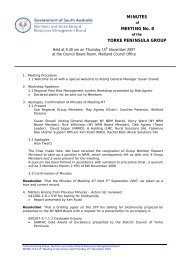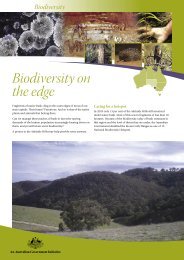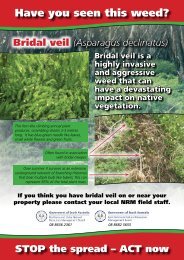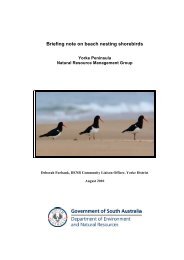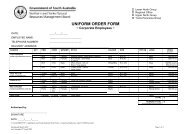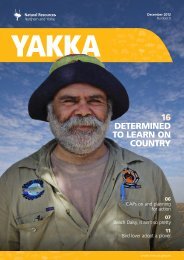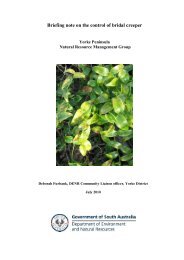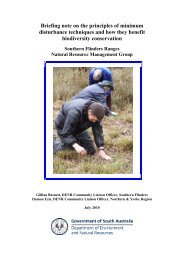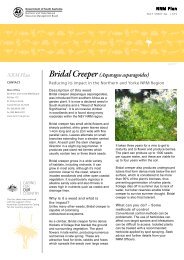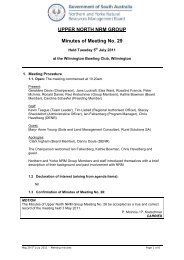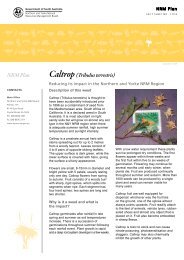Caring for country - Northern and Yorke Natural Resources ...
Caring for country - Northern and Yorke Natural Resources ...
Caring for country - Northern and Yorke Natural Resources ...
Create successful ePaper yourself
Turn your PDF publications into a flip-book with our unique Google optimized e-Paper software.
4many h<strong>and</strong>s<br />
Eye <strong>for</strong> the birds<br />
Birds Australia – a national organisation working <strong>for</strong> the conservation <strong>and</strong><br />
protection of native birds <strong>and</strong> their habitats – recently received a Community<br />
Grant from <strong>Northern</strong> <strong>and</strong> <strong>Yorke</strong> NRM Board to help conserve South Australia’s<br />
migratory <strong>and</strong> beach-nesting shorebirds.<br />
The funding will support the Shorebirds 2020<br />
National Shorebird Monitoring Program <strong>and</strong> Beachnesting<br />
Birds Project in the <strong>Northern</strong> <strong>and</strong> <strong>Yorke</strong><br />
NRM region.<br />
The program started in 2007 in response to growing<br />
concern over declining shorebird populations in<br />
Australia <strong>and</strong> throughout the East Asian-Australasian<br />
Flyway (the path used by shorebirds migrating from the<br />
<strong>Northern</strong> Hemisphere).<br />
It is designed to reinvigorate community ef<strong>for</strong>ts to<br />
monitor Australia’s shorebirds; reliably determine<br />
population trends; <strong>and</strong> support conservation <strong>and</strong><br />
management activities in important shorebird habitats.<br />
A total of 48 shorebird sites are currently monitored in<br />
South Australia by an established network of around<br />
200 volunteers.<br />
In the <strong>Northern</strong> <strong>and</strong> <strong>Yorke</strong> region, there are around<br />
a dozen shorebird sites of particular importance to<br />
migratory shorebirds.<br />
Some birds breed in places like Siberia be<strong>for</strong>e migrating<br />
to areas around Price (stretching along the coast to the<br />
outskirts of Adelaide), Port Victoria <strong>and</strong> the Port Pirie<br />
coast where they spend the summer.<br />
The Beach-nesting Birds Project has been running<br />
in Victoria <strong>and</strong> South Australia <strong>for</strong> five years,<br />
focussing on community engagement <strong>and</strong> education,<br />
threatened species monitoring <strong>and</strong> habitat<br />
management.<br />
“The Hooded plover, which is vulnerable in South<br />
Australia, is a flagship species <strong>for</strong> engaging coastal<br />
communities in beach-nesting shorebird conservation<br />
<strong>and</strong> as an indicator of coastal health,” said Beachnesting<br />
Birds project manager Grainne Maguire.<br />
Shorebirds 2020 program manager, Jo Oldl<strong>and</strong>, said<br />
the monitoring <strong>and</strong> conservation ef<strong>for</strong>ts would be<br />
coordinated with the NYNRM Board, the District<br />
Council of <strong>Yorke</strong> Peninsula <strong>and</strong> local volunteers.<br />
It will involve training <strong>and</strong> supporting volunteers<br />
in monitoring <strong>and</strong> protection techniques, <strong>and</strong><br />
distributing community awareness <strong>and</strong><br />
education materials.<br />
Above: Birds Australia’s Chris Purnell eyes resident<br />
shorebirds at Black Point. With him are novice ‘twitchers’<br />
Vaughan Rattley, Sue Leverton <strong>and</strong> Elizabeth Dau.Photo:<br />
Jenny Oldl<strong>and</strong>, YP Country Times.<br />
Top: Hooded plovers are a flagship species <strong>for</strong> beachnesting<br />
shorebird conservation. Photo: Glenn Ehmke<br />
28 <strong>Northern</strong> <strong>and</strong> <strong>Yorke</strong> <strong>Natural</strong> <strong>Resources</strong> Management Board


